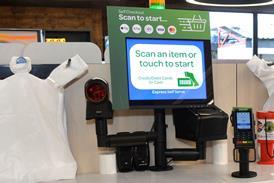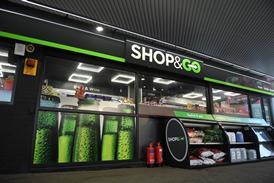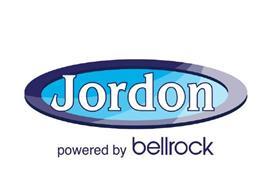With fears about the nation’s expanding waistlines increasingly dominating the headlines, the overall market for traditional crisps and savoury snacks has been pretty flat over the past year.
The good news, however, is that this doesn’t seem to have affected forecourt sales, which have remained in growth. Indeed, recent IRI figures show that bagged snacks in managed forecourts are up by almost 6%.
A major reason for this is that more of us are snacking while on the move and petrol forecourts are ideally placed to serve our demands. According to Mintel’s new report, Snacking on the Go, April 2006, three quarters of adults snack on the move and one in three will do so specifically because they’re on a journey. And since UK consumers are now spending more hours travelling - either commuting for work or on the road during their leisure time - this trend looks set to continue.
But while the old favourite, big brand crisps and snacks still make up the vast majority of sales in forecourts, the health agenda is one that isn’t going to go away, and just as the major players in the market have been adapting their product ranges, so too should forecourt retailers be thinking about tweaking their offer.
In 2005 health drove category growth, accounting for a quarter of all new product sales in the total grocery market. Increasing competition has also come from other areas, such as cereal bars, pre-packaged fruit and processed cheese snacks.
Amanda Oswald, Palmer & Harvey, trading manager for crisps, snacks and soft drinks, says: "There have been a lot of changes in the snacks market this year, both in terms of existing products and new product design. Our product range has also changed to reflect market trends and the demands of our customers. Listing requests are coming through from all of our major national accounts for healthier snacks, with lots of interest in nut, fruit and seed-based snacks in particular."
And while forecourts have traditionally majored on larger-sized packs of crisps and snacks aimed at the ’white van man’, Oswald says recent demand from P&H’s forecourt customers indicates a change in the ranges being stocked. "Healthier snacks are now being included, which reflects overall current market trends," she says.
The emphasis on health has seen some big changes from the key players, who have been busily adapting their core ranges and building their ’better for you’ brands.
With government pressure on the major manufacturers mounting, Walkers has spent millions on overhauling its core range. Relaunched at the beginning of 2006, Walkers Crisps are now cooked in a healthier sunseed oil and contain 70% less saturated fat and 25% less sodium. Nathan Robinson, customer business manager at brand owners PepsiCo, believes this change - said to be the most significant in Walkers’ history - is helping to revive the overall market. "The crisps and snacks category has started to return to growth following the Walkers relaunch," he says. "It’s now up by almost 1% compared to a year ago."
Although the typical forecourt customer is predominantly male - and women are generally seen to be more concerned with healthy eating - Robinson says that retailers would be wrong to assume that men don’t care. "We did a survey last year and 46% of forecourt customers said they would be interested in buying healthy products in the forecourt shop," he explains. "Around 60% of these were men, so it’s not just women who are thinking about health. I think that’s why the relaunch is helping to turn the category around - it’s making a product that men love more healthy and gives people permission to come back and enjoy the brand."
The Walkers relaunch has also seen the addition of lamb & mint flavour in the Big Eat format, which has become the standard size in many forecourts. But while these packs have strong bloke appeal, Robinson says it’s important to offer choice, particularly to female shoppers who prefer a smaller bag. "If you’ve got enough space it’s worth stocking the top three 34.5g flavours - ready salted, cheese & onion and salt & vinegar," he says.
UBUK has also reduced the saturated fat and salt content in its Hula Hoops, Skips and Mini Cheddars lines and is investing £3m in its ’better for you’ products this year. The relaunch of Go Ahead has included expansion into savoury bagged snacks, as well as new cereal bars and a new mini format for Crispy Fruit Slices.
Meanwhile, Sun Valley Snacks has responded to the demand for healthier alternatives to crisps by launching Pretz low-fat, low-sodium pretzels, which come in Worcester sauce and sour cream & onion flavours.
But health hasn’t been the only factor driving the market. As PepsiCo’s Robinson explains, eating patterns have become more complex and contradictory. Although we want guilt-free products that aren’t going to pile on the pounds, at the same time we’re also inclined to want to treat ourselves. "Consumers still enjoy premium snacks, such as Walkers Sensations, which is now a £100m brand and has just been relaunched with new packaging and flavours," he says. "More indulgent snacks such as the Nobby’s range also appeal to consumers wanting a more filling snack - particularly to men."
This continuing desire for indulgent products has seen the premium hand-cooked crisps market put in a strong performance, with overall growth of 12% last year. A spokesperson for Kettle Foods says the manufacturers of hand-cooked crisps have tried to make their offerings more appropriate for impulse outlets, through developments like case-size reduction and shelf-ready packaging. As part of this push, Kettle Chips were launched in a new 40g pack size at the end of last year, replacing the old 50g size with a more competitive rrp of 49p. And as consumers become more aware of what goes into the foods they eat, the company has been making the most of its all-natural ingredients pledge on new-look packaging, as well as moving into the ’better for you’ market with the launch of low-calorie snack range Crispy Bakes.
Bigger sharing bags are doing very well on forecourts, growing in value by 26% over the past year, according to IRI figures. "As forecourts become increasingly sophisticated they’re moving into different segments of the category," explains PepsiCo’s Robinson.
"Sharing is growing massively and forecourts are stocking a larger range of these packs. Another more recent trend is growth in the top-up shop occasion and more forecourts competing in multipacks. Value sales of these is up by almost 7% compared to last year."
However, Robinson adds that the best-selling core impulse lines should remain the retailers’ priority.
In the sharing sector, UBUK recently launched Mini Cheddars Morso’s, a premium cheesy baked snack for adults in a 150g bag.
Meanwhile, the McCoys brand continues to be a best-seller in forecourts and the Specials range has been extended to include Specials Tortillas, which come in four flavours and are available in 175g bags and 40g packs.
Pringles remain popular, and the newer Mini format, launched last autumn, gives consumers the option of a more convenient, single-serve pack for eating on the go. Mini Pringles were recently voted top new savoury snack in a consumer survey and this win has featured in a national radio campaign aimed at driving consumer excitement and demand.
NUTS ABOUT NUT
The snack sector that seems to have benefited most from the health agenda has been nuts, which saw overall growth of 17.5% last year. According to Duncan Hill, commercial director of manufacturer Trigon Snacks, more retailers should be taking advantage of this boom. "Nuts are a really interesting opportunity and I don’t think forecourts are making as much of them as they could," he says. "People still like to snack, but they’re a bit more wary now and nuts are seen as a healthier, natural alternative. There’s also been quite a lot of positive news about their dietary benefits. The past few years have been dynamic for the market."
Hill says that growth is being driven by more exotic nut products, such as cashews, pistachios, Brazil nuts and fruit and nut mixes. "People are now looking for broader options other than just dry-roasted and salted peanuts," he says.
Trigon’s Planters Good For You brand aims to enable forecourts and c-stores to offer an interesting range of premium nuts and nut mixes. Targeted specifically at the impulse sector, there are six lines and bespoke stands available to carry two facings of each.
Inspired by nutritional guru Gillian McKeith’s Channel Four TV series, the You Are What You Eat brand of nuts, fruits and seeds has also been selling well. Made by Sun Valley Snacks, the brand was initially only available in major multiples, however, the company is now targeting the impulse sector with a new 40g snack pack, which comes in three varieties. Marketing manager Jonathan Barr says that forecourt customers increasingly expect a fuller range of snacks, with both standard and healthy options. "Esso and BP have recently signed up to stock the new range and we expect more to follow," he says.
"Esso is doing Summer Savers to drive trial and supporting it with both merchandising and communication solutions. We’re expecting forecourt sales of nuts to continue to grow above market rate."
Finally, ready-to-eat dried meat snacks have also emerged as a growth market over the past year, and have been promoted as a high-protein, low-fat alternative to crisps.
The Jack Links brand has a seven-strong range, including four beef jerky lines and beef steak nuggets. Ernst Sattler, managing director for Europe, says: "We’re offering retailers the chance to generate high-margin returns from a premium range that offers consumers a new snacking option."
Similarly, Matthew Townsend, director of Cruga Biltong, says his company is targeting any outlet where you would expect to find crisps and snacks on sale.
"Our new pack designs, new 25g size and a 99p price point are designed to turn biltong into a mainstream snack product and a healthier choice to the ubiquitous crisp," he says.























No comments yet